- Getting around Lijiang. Dont stay in the Old Towns more than 2 days, there is nothing to do. KRISS Oct 9, 2013 05:46
- 2013 Beijing Temple Fair BENNYLAU Feb 26, 2013 03:29
- Malaysian traveling from KUL - LAX vis Shanghai PVG ZATI_DY Jan 3, 2013 20:15
Where Three Countries Meet
- Views: 6687
- |Vote: 1 0
- |Add to Favorites
- |Recommend to Friends
To the end of the road
I’ve always loved that feeling of getting to the end of the road, literally. Back in my native England I used to delight in arriving at London’s Paddington Station, the great terminus, where the trains reach the end of the line in a sweeping arc. Somehow it felt like a “proper” arrival.
Being a journey-junkie, perhaps for me there is no more worthy an ending to any trip than running out of the land itself. To go to the edges feels significant, like reaching a final destination at the tip of the world, a place from where you can only ever return.
Unlikely though it sounds to be able to get to the edge of a country as huge as China, Jilin Province does provide plenty of opportunities. One of the most interesting of which lies on the southeastern fringes of the province map where the bulk of China is squeezed into a narrow finger by her neighbours. This is where Russia, North Korea and China rub shoulders, this is where three countries meet.
Destination Fangchuan (防川)
Something about Yanji (延吉) city felt closed and alienating to me and so when I found myself there with a day to spare I knew only that I wanted to get away. I checked out of my tiny side-street ‘hotel’ and headed for the bus station. On the way I saw the aftermath of a road accident between a car and a motorbike; there were police and a great crowd. I skirted the edges but somehow managed to find one of the victims in my path, a large man covered in blood, an ineffectual towel held to his head. I felt my stomach plummet but there was nothing I could do but walk on.
I arrived at the bus station and got my ticket for a small town called Hunchun (珲春). There are no direct buses from Yanji to Fangchuan but the ticket seller was sure I could change buses in Hunchun. I believed her.
The earlier incident had left me feeling low and I got on the minibus preoccupied, and dozed the scenery away. I barely remember the trip only the arrival in some deserted part of Hunchun town and that inevitable switching-on-of-the-brain that is required for single travellers in China. I registered nothing but an empty road, a rickshaw and a gaggle of taxis and wondered how I was going to find the bus to Fangchuan. I quickly asked the driver who looked confused for a moment and then pointed vaguely along the empty road and muttered something about ‘this afternoon’.
[image: men fishing, Yanji City]
The Taxi Driver and the Rickshaw Driver
The minibus was in a hurry to leave and I found myself alone surrounded by the ubiquitous ‘hellos’ of the taxi drivers. One approached me and asked me where I wanted to go, I explained I was heading for Fangchuan and he told me there were no buses… but he would take me there for 150RMB.
I stared at him without my usual smile and told him the bus driver had just told me there was a bus (I wasn’t sure of this, I was holding fast to the ticket seller’s words in Yanji and the driver’s almost unintelligible mumbles and pointing).
The taxi driver wasn’t relenting and the other drivers, being passengerless and eager not to deal with this foreigner, had dispersed. I stubbornly refused to get into his taxi and a stand-off ensued, the driver with his taxi – and me with my principals and the possibility of being stranded.
The lone rickshaw driver had been watching the exchange from afar, perhaps he felt sorry for me but in the silence he ambled over and told me he could take me to the bus station for 2RMB. ‘There’s a bus to Fangchuan there?’ I asked him and he nodded.
‘Why would you lie to me?’ I asked the taxi driver, (hoping to make him think twice about trying to dupe Westerners) but he neither answered nor changed the expression on his face. We left him there alone.
Noodles and Motorbikes
The rickshaw driver pedalled me a long way and when we arrived at the back street car park that doubled as the bus station, the next bus was not for a couple of hours. The rickshaw driver asked me if I wanted to eat and did I like noodles… I couldn’t think of anything better to do so I agreed to let him take me to the restaurant.
It was a large diner and busy with early lunchers, obviously popular. I thanked him and gave him 5RMB for his troubles, the least I could do. I sat and ordered, as it turned out, a huge fruit bowl full of cold noodles: delicious.
I was interrupted, perhaps 10 minutes later by the rickshaw driver. Happily gestured for him to join me but he wanted to know if I would be interested in going to Fangchuan by motorbike. I was immediately reminded of the earlier accident and declined:
“Thanks… but I don’t think it is safe. I will catch the bus.”
“You are a little scared ?” he asked.
Not a little I thought, remembering the blood… “Yes.”
“Don’t worry. The driver is old and slow, he will drive slowly for you, he is my friend. He has binoculars and will stop and show you all the interesting places on the way. 60RMB return.”
“But I want to stay in Fangchuan!” I told him.
“In Fangchuan ? There’s nothing there!” He laughed.
The rickshaw driver looked at me and waited expectantly.
[image: my 'fruit bowl' of noodles, Hunchun]
The open road
I procrastinated for some time... before agreeing.
The motorbike driver was 55 and had a kind, lined face. He expertly slung my huge rucksack onto the back of the bike and handed me a dodgy, army-green, builder-like hard hat. My cool motorbike-chick image ruined before it had even begun, I donned the hat and we were off.
The open road is addictive. The long, straightness of it merged greyly into the distance and amazingly the nearby hills I pointed to belonged to North Korea. This is one narrow stretch of land.
Travelling by motorbike is a unique experience; everything is so near, so real. I could smell the pine logs being carried by the butch blue trucks and the sharp scent of the goats that were grazing by the hard shoulder.
The driver kept up a steady stream of chatter, half his words blew past me, never-heard, and half I caught in my ears to reply to. Riding along with the wind tangling in my hair, I couldn’t believe that this was my first ever motorbike ride…
[image: motorbike & my rucksack]
North Korea: so near and yet so far
Heading south to Fangchuan the Tumen River (图们江) was our constant companion, and an enchanting companion it proved to be. This silver blue band bordered by wide pale-orange sand banks and the dense green hills beyond it was an enticing glimpse of North Korea. Far more romantic than the tourist-boat straits at Dandong (丹东) where the imitation big wheel and factory chimneys stare in stasis over the murky Yalu River (鸭绿江).
The driver stopped at the serious iron road bridge that joins North Korea and China. The first young soldier seemed happy for us to go a little closer but the second soldier wore a face as grim as the iron bridge. Despite pleas from myself and the driver I wasn’t allowed within 50m of the deserted bridge’s entrance, let alone on it. I was disappointed.
A neighbouring tiny house, the only house on the whole road, allowed me to get a closer view of the bridge in order to take a picture; but even here, part of the garden was fenced off with barbed wire. I would get no closer.
With the binoculars I could make out a tractor or two and the heads of farmers amidst the cornfields opposite, but nothing more: ordinary people living their lives.
And over North Korea the storm clouds were assembling. Rain, as we would find out later, has no respect for borders!
[image: Tumen River & North Korea]
Seashore Tower: where three countries meet
At around 75 kilometres from Hunchun there’s a sense of land running out. North Korea squeezing in on one side and Russia, as yet invisible, somehow managed to force its presence on the ever-decreasing Chinese soil. A check-point appeared from nowhere and a 20RMB ticket was required to access the last few kilometres and ascend Seashore Tower.
From Seashore Tower, it was possible to see the North Korean city of Doumanjiang and the Russian Town of Hassan. A 560m long railroad bridge connected the two countries beyond the edge of China. It’s said that on a clear day it’s possible to see Japan…
In truth there’s little to distinguish the countries from each other. The same sky overhead and the same slightly dirty green land underfoot. Binoculars, and I was thankful for the loan from my driver, allow a little more detailed view of the towns.
There were a few cars in the car park and a small assortment of tourists, Chinese and Korean, had made it down to this tip of China to indulge in the obligatory photo shoot and gaze with binoculars over 3 countries. Ironically those of us watching from the Seashore Tower itself were as multi-national as the view.
[image: Russian town of Hassan]
Here comes the rain
It would have been impossible to avoid the rain, the only way from here was back. We had reached, after all, the end of the road, the end of China. I felt more than contented; taking a motorbike to the edge had only made the sense of adventure, the freedom of the road, all the stronger. The imminent storm was strange and mysterious, heralding our return. As we made our way down from the Seashore Tower the first fat drops of rain landed and the Tumen River was swathed in mistiness.
My driver, as if by magic, produced a vast purple raincoat for me. I pulled the bright yellow waterproof cover over my rucksack. We got on the bike, exchanged fearless grins and headed home into the darkening bulk of China.
[image: rainfall over North Korea, China & The Tumen River]
Information (August 2006)
Fangchuan makes for an interesting travel diversion.
Good idea for a daytrip from Yanji.
Getting there:
From: Yanji to Hunchun
By: Bus
Cost: 21RMB
Time: 8.20am depart Yanji, 11am arrive Hunchun
From: Hunchun to Fangchuan
By: Motorbike
Cost: 60RMB return
Distance: 150km (total)
English: ‘Glancing over three countries’
Chinese: 一眼望三国
Pinyin: yi1 yan3 wang4 san1 guo2
Entrance fee: 20RMB
This is the name of the place where the Seashore Tower is located.
I got here by asking to go to Fangchuan.
Nothing here except the tower, a few souvenir stalls, some information signs (in English, Korean and Chinese) and the views of Russia & North Korea.
Tourist Attractions
In fact, the area has a couple of other tourist attractions of sorts.
There’s a Sand Dune Park and Lotus Lake that might be worth exploring, but I went in the middle of summer and they were deserted.
Accommodation
Look at spending the night in Hunchun or getting back to Yanji. Really Fangchuan is tiny and I very much doubt you can stay there.
[image: monument, UN World Peace Centre, at the corner of the 3 countries]



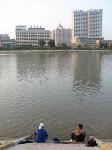
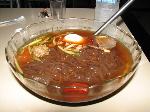
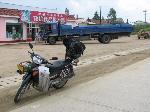
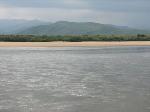
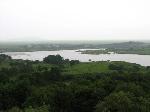
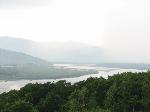
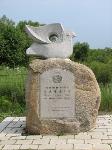
 Copyright © 1998-2026 All rights reserved.
Copyright © 1998-2026 All rights reserved.